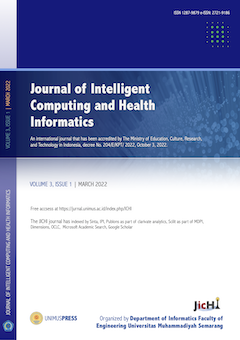Topic Modelling using Latent Dirichlet Allocation (LDA) to Investigate the Latent Topics of Mathematical Creative Thinking Research in Indonesia
(1) Universitas Bengkulu
(*) Corresponding Author
Abstract
Keywords
Full Text:
PDFReferences
Ali, D., Zubaidah Amir, M. Z., & Vebrianto, R. (2021). Literature Review: Mathematical Creative Thinking Ability, and Students' Self Regulated Learning to Use an Open Ended Approach. Malikussaleh Journal of Mathematics Learning, 4(1), 52-61. http://doi.org/10.29103/mjml.v4i1.3095
Arifuddin, A., Wahyudin, W., Prabawanto, S., Yasin, M., & Elizanti, D. (2022). The Effectiveness of Augmented Reality-Assisted Scientific Approach to Improve Mathematical Creative Thinking Ability of Elementary School Students. Al Ibtida: Jurnal Pendidikan Guru MI, 9(2), 444-455. http://dx.doi.org/10.24235/al.ibtida.snj.v9i2.11647
Blei, D. M. (2012). Probabilistic topic models. Communications of the ACM, 55(4), 77-84. http://doi.acm.org/10.1145/2133806.2133826
Chen, X., Zou, D., Cheng, G., & Xie, H. (2020). Detecting latent topics and trends in educational technologies over four decades using structural topic modeling: A retrospective of all volumes of Computers & Education. Computers & Education, 151, 103855. https://doi.org/10.1016/j.compedu.2020.103855
Daiana, P., Surahmat, S., & Fathani, A.H. (2021). Profile of Students’ Mathematical Creative Thinking Ability in Solving Mathematical Problem. Formatif: Jurnal Ilmiah Pendidikan MIPA, 11(1), 49-62. http://dx.doi.org/10.30998/formatif.v11i1.7810
Debortoli, S., Müller, O., Junglas, I., & Vom Brocke, J. (2016). Text mining for information systems researchers: An annotated topic modeling tutorial. Communications of the Association for Information Systems, 39(1), 7. https://doi.org/10.17705/1CAIS.03907
Denny, M. J., & Spirling, A. (2018). Text preprocessing for unsupervised learning: Why it matters, when it misleads, and what to do about it. Political Analysis, 26(2), 168-189. https://doi.org/10.1017/pan.2017.44
de Vink, I. C., Willemsen, R. H., Lazonder, A. W., & Kroesbergen, E. H. (2022). Creativity in mathematics performance: The role of divergent and convergent thinking. British Journal of Educational Psychology, 92(2), e12459 . https://doi.org/10.1111/bjep.12459
Fatah, A., Suryadi, D., & Sabandar, J. (2016). Open-Ended Approach: An Effort in Cultivating Students' Mathematical Creative Thinking Ability and Self-Esteem in Mathematics. Journal on Mathematics Education, 7(1), 11-20. https://doi.org/10.22342/jme.7.1.2813.9-18
Gürcan, F. (2018, September). Major research topics in big data: A literature analysis from 2013 to 2017 using probabilistic topic models. In 2018 International Conference on Artificial Intelligence and Data Processing (IDAP) (pp. 1-4). IEEE. https://doi.org/10.1109/IDAP.2018.8620815.
Hadar, L. L., & Tirosh, M. (2019). Creative thinking in mathematics curriculum: An analytic framework. Thinking Skills and Creativity, 33, 100585. https://doi.org/10.1016/j.tsc.2019.100585
Hornik, K., & Grün, B. (2011). topicmodels: An R package for fitting topic models. Journal of statistical software, 40(13), 1-30. https://doi.org/10.18637/jss.v040.i13
Hwang, S., & Cho, E. (2021). Exploring Latent Topics and Research Trends in Mathematics Teachers’ Knowledge Using Topic Modeling: A Systematic Review. Mathematics, 9(22), 2956. https://doi.org/10.3390/math9222956
Mahmudin, C., Sumarmo, U., & Kustiana, A. (2020). The Effect of Inductive-Deductive Approach on Students’ Mathematical Creative Thinking Ability and Self-Efficacy. Journal of Innovative Mathematics Learning (JIML), 3(4), 215-226. http://dx.doi.org/10.22460/jiml.v3i4.p215-226
Newton, D., Wang, Y., & Newton, L. (2022). ‘Allowing them to dream’: fostering creativity in mathematics undergraduates. Journal of Further and Higher Education, 1-13 . https://doi.org/10.1080/0309877X.2022.2075719
Nufus, H., & Duskri, M. (2018). Mathematical Creative Thinking and Student Self-Confidence in the Challenge-Based Learning Approach. Journal of Research and Advances in Mathematics Education, 3(2), 57-68. https://doi.org/10.23917/jramathedu.v3i2.6367
OECD. (2019). Draft framework for the assessment of creative thinking in Pisa 2021. Paris: OECD Publisher.
Purwosetiyono, F. X. D., Sa’dijah, C., Hidayanto, E., Chandra, T. D., As’ari, A. R., & Irawan, E. B. (2018). Prospective teachers' conception of mathematical creative thinking. International Journal of Insights for Mathematics Teaching (IJOIMT), 1(2), 106-114. ISSN 2087-8885.
Sari, D. N. K., & Masrukan, M. (2022). Application of Socrative-Based Assessment to Measure Mathematical Creative Thinking Ability with Problem Based Learning Model Viewed from Curiosity. Unnes Journal of Mathematics Education, 11(2), 137-147. https://doi.org/10.15294/ujme.v11i2.59901
Sievert, C., & Shirley, K. (2014, June). LDAvis: A method for visualizing and interpreting topics. In Proceedings of the workshop on interactive language learning, visualization, and interfaces (pp. 63-70). http://dx.doi.org/10.3115/v1/W14-3110
Siswono, T. Y. E. (2010). Leveling students' creative thinking in solving and posing mathematical problem. Journal on Mathematics Education, 1(1), 17-40. https://doi.org/10.22342/jme.1.1.794.17-40
Suherman, S., & Vidákovich, T. (2022). Assessment of Mathematical Creative Thinking: A Systematic Review. Thinking Skills and Creativity, 101019. https://doi.org/10.1016/j.tsc.2022.101019
Susiaty, U. D., Prihatin, I., & Hartono, H. (2021). Developing and Playing Geometric Puzzle Game to Enhance the Ability of Mathematical Creative Thinking. Kreano, Jurnal Matematika Kreatif-Inovatif, 12(1), 39-50. https://doi.org/10.15294/kreano.v12i1.26613
Syaputri, A. W., Irwandi, E., & Mustakim, M. (2020). Naïve Bayes Algorithm for Classification of Student Major’s Specialization. Journal of Intelligent Computing and Health Informatics (JICHI), 1(1), 15-19. https://doi.org/10.26714/jichi.v1i1.5570
Taufiq, T., Budiarto, M. T., & Siswono, T. Y. E. (2018, December). The creative thinking process of teachers in designing mathematical tasks. In International Conference on Mathematics and Science Education of Universitas Pendidikan Indonesia (Vol. 3, pp. 634-638). P-ISSN 2655-2361, E-ISSN 2655-3252.
Tohir, M., & Muhasshanah, M. (2021). Mathematical issues in two-dimensional arithmetic for analyze students' metacognition and creative thinking skills. Alifmatika: Jurnal Pendidikan Dan Pembelajaran Matematika, 3(2), 170-183. https://doi.org/10.35316/alifmatika.2021.v3i2.170-183
Wiraprana, S., & Surya, E. (2022). The Development of Mathematics Learning Devices Based on Realistic Approaches to Improve Creative Thinking and Mathematical Communication Skills for 8th Grade Junior High School Students. Jurnal Cendekia: Jurnal Pendidikan Matematika, 6(2), 2011-2024. https://doi.org/10.31004/cendekia.v6i2.1443
Yang, D., Kleissl, J., Gueymard, C. A., Pedro, H. T., & Coimbra, C. F. (2018). History and trends in solar irradiance and PV power forecasting: A preliminary assessment and review using text mining. Solar Energy, 168, 60-101 . https://doi.org/10.1016/j.solener.2017.11.023
Article Metrics
Abstract view : 644 timesPDF - 113 times
DOI: https://doi.org/10.26714/jichi.v3i2.11428
Refbacks
- There are currently no refbacks.
____________________________________________________________________________
Journal of Intelligent Computing and Health Informatics (JICHI)
ISSN 2715-6923 (print) | 2721-9186 (online)
Organized by
Department of Informatics
Faculty of Engineering
Universitas Muhammadiyah Semarang
W : https://jurnal.unimus.ac.id/index.php/ICHI
E : jichi.informatika@unimus.ac.id, ahmadilham@unimus.ac.id
This work is licensed under a Creative Commons Attribution-ShareAlike 4.0 International License.








